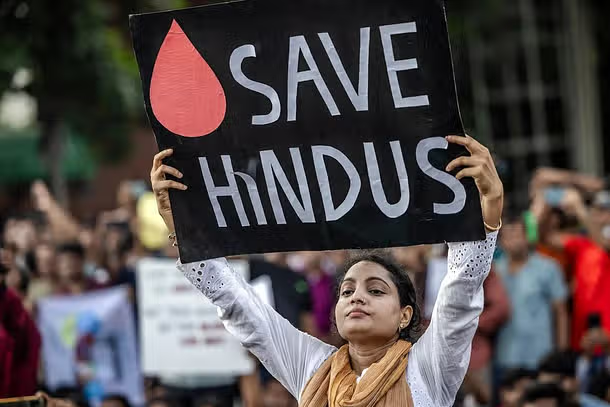Relief Denied: Bangladesh Army Blocks Aid to Hindu Victims of Blasphemy-Fueled Attacks in Gangachara
- MGMMTeam

- Aug 8, 2025
- 4 min read
A quiet corner of northern Bangladesh erupted into chaos in late July 2025, when communal violence engulfed the Betgari Union of Gangachara Upazila, Rangpur District. The trigger was an alleged blasphemy post on Facebook, purportedly shared by an 18-year-old Hindu youth. However, further investigation revealed the post to be the work of a fake account impersonating the youth, intended to provoke unrest.
Despite the truth behind the post emerging later, the damage had already been done. Mobs mobilized with speed and precision, some reportedly summoned through mosque loudspeakers. In a matter of hours, at least 20 homes and shops belonging to Hindu families were looted, vandalized, and burned. Even sacred Tulsi Manchas — central to Hindu domestic worship — were desecrated. Terrified families fled their homes in the dead of night, carrying what little they could salvage.

A Troubling Response from Authorities
As is common in many communal incidents in Bangladesh, state authorities arrived only after the violence had run its course. But what followed has shocked civil society even further. On August 4, a relief effort was initiated by the Hindu rights organization Bangladesh Sammilita Sanatani Jagran Jote, led by activist Prosenjit Kumar Haldar and spiritual teacher Sri Gopinath Das Brahmachari. Their mission was purely humanitarian: to deliver rice, oil, soap, shampoo, clothing, and other essentials to the displaced victims.
Instead of receiving support, the relief team found themselves confronted by the Bangladesh Army and paramilitary Ansar forces. The volunteers were detained, separated, and subjected to aggressive interrogation. Spiritual leader Gopinath Das Brahmachari was reportedly insulted and demeaned. Authorities used loudspeakers to declare that no aid would be permitted without formal permission from the district administration — an administration that had remained conspicuously inactive when the homes were being attacked just days earlier.
A Pattern of Weaponized Blasphemy
The events in Gangachara are not isolated. They are part of a disturbing pattern that has intensified in recent years: blasphemy allegations being used as a pretext for anti-Hindu violence. In June 2025, a similar mob attack occurred in Lalmonirhat, where an elderly Hindu man and his son were falsely accused of insulting Islam. They were brutally beaten, despite having no connection to the alleged offense. Days later, the real culprit — a young Muslim man — was identified and arrested, but by then, the damage had already been done.
According to OpIndia’s investigations, there have been at least thirteen major incidents since early 2024 in which Hindus were attacked, their homes destroyed, and temples vandalized over fabricated or exaggerated claims of blasphemy. These claims have become tools of targeted aggression, often spreading via social media before authorities can intervene or verify the facts.
Historical Echoes and Ongoing Persecution
The persecution of Hindus in Bangladesh has a long and painful history. Similar waves of violence were seen in 2016 in Nasirnagar, when mobs destroyed hundreds of Hindu homes and temples over a single social media post. In 2021, during the Durga Puja festival, another major episode of anti-Hindu violence unfolded across several districts, leaving dozens of temples damaged and hundreds of families homeless.
These incidents are not random; they reflect a steady decline in the Hindu population of Bangladesh, which has dropped from over 22% in 1947 to less than 8% today. Mass migration, fear, and targeted violence have driven many Hindus to leave the country or live in silence, their constitutional rights hanging by a thread. Human rights organizations, including Amnesty International, have repeatedly called on the Bangladeshi government to protect its minorities, ensure justice, and break the cycle of impunity.
A State’s Duty and a Community Abandoned
The Gangachara incident reveals not just the vulnerability of Hindus in Bangladesh, but also a larger failure of the state. It is deeply troubling that while mobs can assemble and attack without interference, peaceful relief efforts are blocked by armed forces under the guise of administrative procedure. This asymmetry in enforcement — silence during violence, strict control during recovery — sends a chilling message to minorities: they are on their own.
No financial compensation has been offered to the affected families. No protection has been granted to those returning to shattered homes. The perpetrators of the false blasphemy post remain unidentified, while innocent victims continue to suffer in silence. Those trying to help are being silenced, humiliated, and pushed away.
Conclusion: A Cry for Justice and Humanity
The right to humanitarian aid is fundamental, especially when communities have been displaced by violence. The refusal to allow relief distribution in Gangachara is not just a bureaucratic hurdle — it is a moral failure. Bangladesh, a nation that proclaims secularism and pluralism in its constitution, must act swiftly to protect all its citizens, regardless of religion.
If the cycle of blasphemy accusations and mob justice continues unchecked, and if the state continues to respond with silence or suppression, Bangladesh risks not just domestic unrest but international condemnation. At stake is not just the future of its Hindu population — but the soul of the nation itself.
(Sources: OpIndia, SwarajyaMag, Amnesty International)




Comments